La Dolce Vita
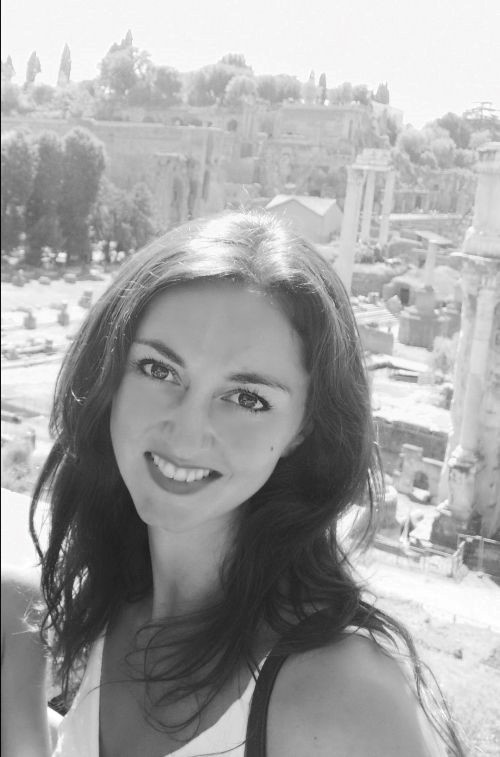
Costanza Ferrari Bardile arrived in Vancouver during the Covid 19 pandemic, in January 2021. She was relocating from Singapore, where she had done her PhD and then worked as a post-doctoral fellow in Dr. Mahmoud Pouladi’s lab. Dr. Pouladi had subsequently hired Costanza to continue her work investigating white matter pathology in Huntington Disease (HD) in his new lab located at the CMMT. However, the pandemic slowed the relocation and lab set up which, not surprisingly, proved challenging. “I had a very hard start in Vancouver, for several reasons,” she said. “I was alone in the lab for the first five to six months. In science you need to constantly discuss your findings and help each other. Now we have 10 people, and it’s a nice group.”
A recipient of a Hereditary Disease Foundation Fellowship Award, Costanza is focused on characterizing the ways in which the HD mutation affects human oligodendrocytes and myelination of neurons, potentially pointing to ways of delaying the disease or lessening its severity.
HD is the leading cause of genetic dementia and Costanza knows the devastating effects it carries first-hand as she had an aunt with the disease. For this reason, and the fact that she finds the disease itself fascinating, she decided to pursue a career in HD research.
It was a meeting with Dr. Elena Cattaneo in Milan, Italy, that proved to be pivotal in Costanza’s career. “Dr. Elena Cattaneo is a key figure in Huntington research,” Costanza said. “She has a lot of insight into the evolution of the gene,” Costanza said. “I went to one of Dr. Cattaneo’s talks and her passion for the subject was captivating. Basically, she was the professor who really inspired me to pursue and study HD.” Following completion of her MSc, Costanza worked in Dr. Cattaneo’s lab in Milan for a year and a half as a junior fellow researcher.
After completing that lab posting Costanza decided to apply for PhD positions and found Dr. Pouladi’s lab in Singapore. “I really liked him when we met on our video call,” she said. “He’s very smart, professional and kind, with a contagious enthusiasm for science. I applied for a scholarship in Singapore and got it and joined his lab for five years, four of those for my PhD.”
Her PhD focused mainly on investigating the role of oligodendrocytes, which are the cells responsible for making myelin in the brain. Oligodendrocytes aid communication between different brain regions and provide support to neurons. Recent research, including Costanza’s work for her PhD, has shown that oligodendrocytes are affected by the HD mutation.
“Until recently, most of the research in HD involved trying to understand why neurons die in this disease,” Costanza said. “More recently, research has focused on myelin and it is now known that it degenerates during the disease.” While this was originally thought to be a consequence of neuronal death, her work and others has shown that something happens to the oligodendrocytes in HD that causes them to become dysfunctional. “It seems to be a cofactor of things,” she said. “There seems to be a primary cause originating from the oligodendrocytes themselves. I’ve been studying this for the past eight years, first in mouse models and now in pluripotent stem cells.” And in a recently published paper she and her colleagues showed that by removing the HD mutation specifically in oligodendrocytes in an HD animal model, it is possible to rescue the myelin deficits, thereby potentially suggesting a target for intervention. “If you restore myelin, you will also see some improvement in behaviors. This is very interesting because it shows that oligodendrocytes play an important role in the disease,” Costanza said.
Originally from Italy, Costanza enjoys her new life in Vancouver, and visits home on a regular basis, she misses her family. “I’m a very social person,” she said. Working through the pandemic lockdown in a new country without the benefit of colleagues on site, forced her to find ways to connect with people directly. So Costanza joined a social run club. “I joined just for the social but after I joined the club, I realized that I actually like running” she said. “I run a lot now. In February I ran my first half marathon. I never thought I could do that, but apparently all you need is training and dedication,” she said. And, many would argue, the will to run a marathon.
She also has a group of Italian friends here in Vancouver. “I was so happy – speaking my own language,” she said. “I’ve met so many people. And I’ve become more active here, everyone is interested in the outdoors. In Italy people just go out for happy hour, drinks and food. Here I play volleyball, I go hiking, skating, dancing. I have a lot of friends.” So it seems that while it may have been a hard start, it’s now la dolce vita.
Living the Dream
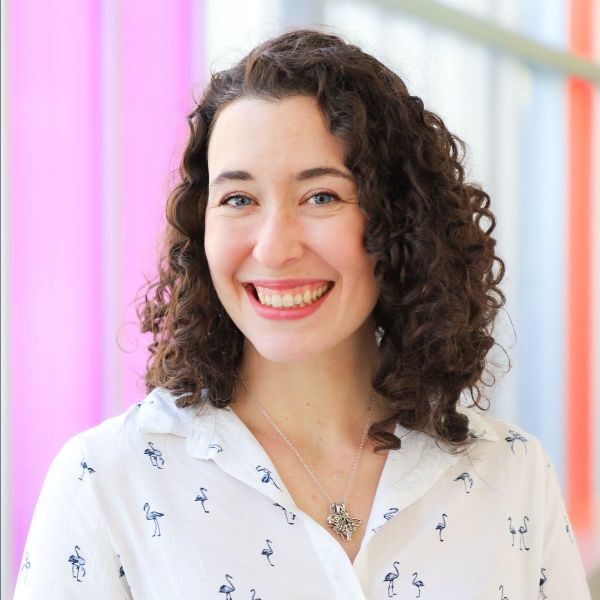
In 2019, Hannah-Ruth Engelbrecht moved from Durban, South Africa, where winters rarely see temperatures of less than 18C, to Vancouver, where she experienced snow for the first time. She had left behind her dreams of becoming a big game vet in her native South Africa in high school, realizing that she wanted to work with people instead. That choice ultimately led her to pursue her PhD through UBC and Dr. Michael Kobor’s lab, where she is currently investigating perturbations to human health across the lifespan, and the impact of those disturbances on DNA methylation.
Finding Dr. Michael Kobor was not an accident. Having completed her BSc in genetics and human physiology at the University of Cape Town, SA, Hannah-Ruth went on to do her MSc in medical genetics, also at the University of Cape Town. “I specialized in the genetics of mood disorders and familial bipolar disorder for my masters,” she said. While I was doing that degree I worked with a psychiatrist at the University of Cape Town, Dan Stein, who collaborates with Michael Kobor at UBC.” At some point during her masters, Hannah-Ruth attended a lecture by of Michael Kobor’s postdoctoral fellows. “I went to the presentation because I remembered being interested in epigenetics from an essay we did in high school,” she said. “I loved the talk, and I went to hear the presentation twice.” Interestingly, Hannah-Ruth keeps and had made notes from that talk, which proved fortuitous. “Years later I looked in the notebook from that period and I had written ‘Mike Kobor, PhD?’ “
After completing her masters and a year’s work at the National Health Laboratory Service of South Africa, establishing next generation sequencing tissue typing in the health care sector, Hannah-Ruth decided to pursue her PhD. “I spoke with a family friend who also worked in genetics and he recommended UBC Genome Science and Technology Program. “What I liked about the GSAT program is that it had a rotation component so for the first three months you can do three one-month rotations through the labs and pick your options.” She recalls that during one of her first two rotations she learned how to feed a comb jellyfish. “It was bizarre. Apparently, they are very endangered,” she said. “I realized I still wanted to work in humans.” Looking through the associated faculty for a third rotation Hannah-Ruth came across Dr. Mike Kobor. “He hadn’t offered a rotation for that year so I contacted him and he was willing to meet with me. I ended up doing a rotation with him, which I really enjoyed and I stayed.”
Transitioning from life in Africa had its surprises. “I moved to Vancouver in August 2019, just before the bus strike,” Hannah-Ruth said. “I remember thinking how tame it was here. Strikes are a much more serious affair where I come from. People could still get to work here, it just took longer.” Then came her first Canadian winter and the global pandemic. “The winter set in and I remember thinking how dark it was all the time. Then it snowed. That was magical. I went bob sledding. I’d never seen snow fall until I came to Canada. I had never had to contend with the cold. Houses aren’t heated back home because they’re built to insulate against heat in the summer so we just bundle up during the night in the winter.”
Getting through that first dark winter as well as a global pandemic proved stressful. “I was lodging at Green College at UBC with students from all over the world and we became good friends during the pandemic. There was a group of us that became very good friends and we rented a house together. We became family during the pandemic because we were all stressed being away from our own families, so far away from our homes.”
Like so many people during the pandemic, Hannah-Ruth also found working from home isolating. “I could work for hours or days on something and if I got stuck I was afraid to reach and ask for help in case I disturbed someone.” she said. “When you’re working in the lab and you get stuck on something, you can try and figure it out and if you’re still stuck you can ask someone near you to help and the whole interaction is done in 20 minutes.”
Now she is happily settled and looking forward to the future. “I would love to be involved in the knowledge translation space,” she said. “It takes so long to get new discoveries implemented into the clinical setting and while there will always be a place for basic research, there is often a disconnect with researchers in that they don’t know how to plan their projects to make them clinically actionable. I would love to be involved in that kind of space,” she said. “My father’s ethos when my brother and I were growing up was that we must leave the world a better place than we found it. That’s what I hope to do.”
It’s Official
The Edwin S.H. Leong Centre for Healthy Aging (ELCHA) is now a UBC Faculty of Medicine-approved research centre.
The ELCHA seeks to transform healthy aging by expanding interdisciplinary research focused on biological, social, cultural and environmental factors that influence aging trajectories and harness that information to devise new strategies to promote healthy aging for all.
Dr. Michael Kobor, CMMT Senior Scientist, and a professor in the Department of Medical Genetics and the Edwin S.H. Leong UBC Chair in Healthy Aging — a UBC President’s Excellence Chair, has been appointed ELCHA’s inaugural Director.
Congratulations Mike!
Best Day
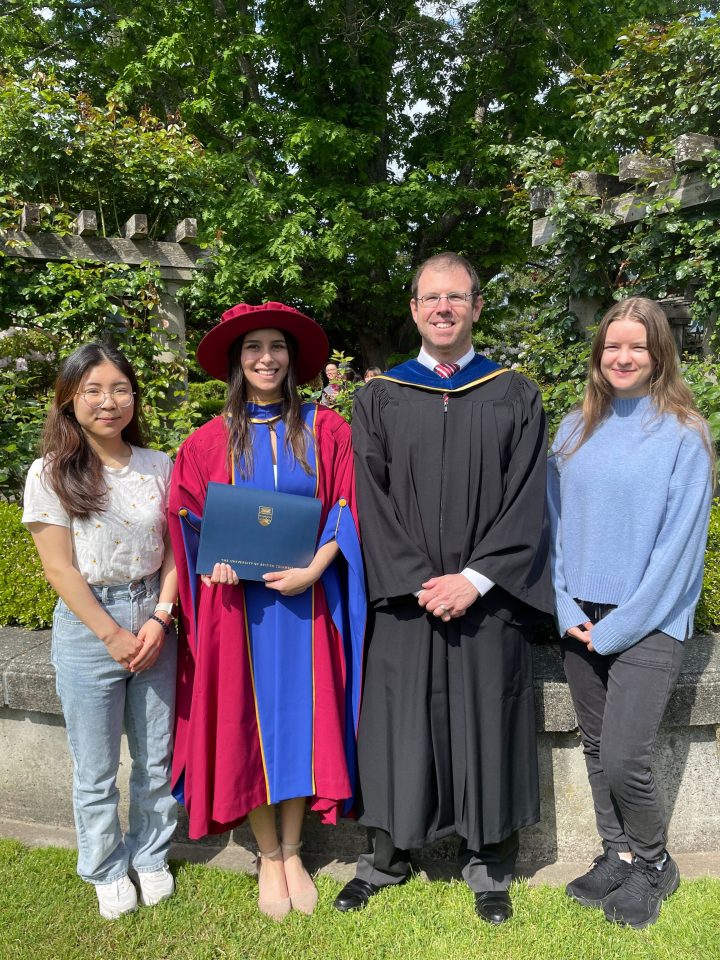
Congratulations to Kelsie Doering, Taubert Lab
Remembering Darcy Davis (1958 – 2023)
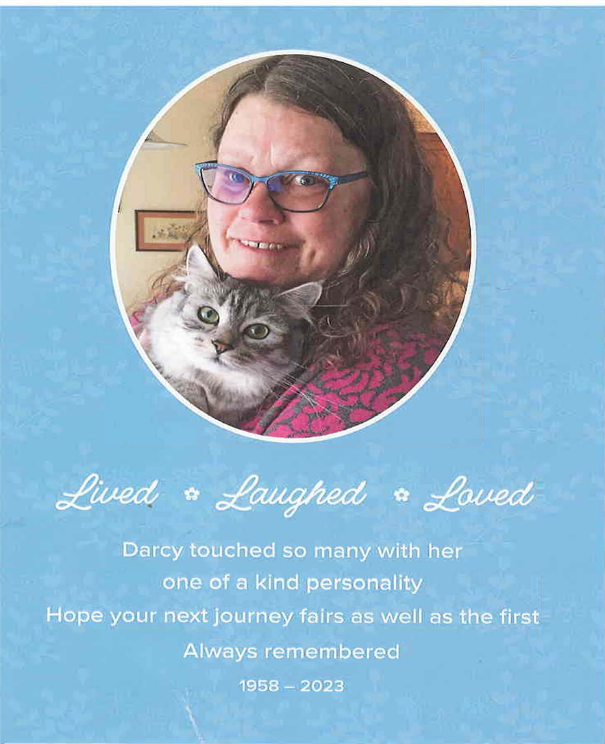
| On behalf of our entire Transgenic Facility team, our deepest sympathies go out to the family and friends of Darcy Davis. Darcy passed suddenly and unexpectedly on May 24, 2023. She will be dearly missed. |
Artist’s Corner (or emerging data nerds?)

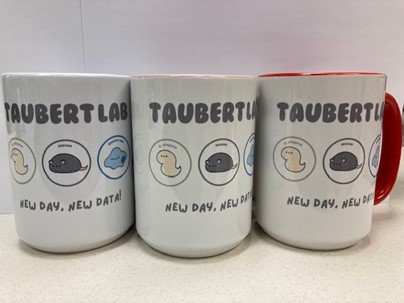
Publications
Van Raamsdonk JM, Al-Shekaili HH, Wagner L, Bredy TW, Chan L, Pearson J, Schwab C, Murphy Z, Devon RS, Lu G, Kobor MS, Hayden MR, Leavitt BR. Huntingtin Decreases Susceptibility to a Spontaneous Seizure Disorder in FVN/B Mice. Aging Dis. 2023 May 3. doi: 10.14336/AD.2023.0423. PMID: 37199581.
Fornes O, Av-Shalom T, Korecki AJ, Farkas RA, Arenillas DJ, Mathelier A, Simpson EM, Wasserman WW. OnTarget: in silico design of MiniPromoters for targeted delivery of expression. Nucleic Acids Res. 2023 Jul 5;51(W1):W379-W386. doi: 10.1093/nar/gkad375. PMID: 3766953.
Adair BA, Korecki AJ, Djaksigulova D, Wagner PK, Chiu NY, Lam SL, Lengyell TC, Leavitt BR, Simpson EM. ABE8e Corrects Pax6-Aniridic Variant in Humanized Mouse ESCs and via LNPs in Ex Vivo Cortical Neurons. Ophthalmol Ther. 2023 Aug;12(4):2049-2068. doi: 10.1007/s40123-023-00729-6. Epub 2023 May 20. PMID: 37210469.
Peeters S, Leung T, Fornes O, Farkas RA, Wasserman WW, Brown CJ. Refining the genomic determinants underlying escape from X-chromosome inactivation. NAR Genom Bioinform. 2023 May 30;5(2):lqad052. doi: 10.1093/nargab/lqad052. eCollection 2023 Jun. PMID: 37260510.
McDade TW, Ryan CP, Adair LS, Lee NR, Carba DB, Maclsaac JL, Dever K, Atashzay P, Kobor MS, Kuzawa CW. Association between infectious exposures in infancy and epigenetic age acceleration in young adulthood in metropolitan Cebu, Philippines. Am J Hum Biol. 2023 Jun 20;e23948. doi: 10.1002/ajhb.23948. Online ahead of print. PMID: 37338007.
Chen Y-C, Taylor AJ, Fulcher JM, Swensen AC, Dai X-Q, Komba M, Wrightson KLC, Fok K, Patterson AE, Klein-Geltink RI, MacDonald PE, Qian W-J, Verchere CB. Deletion of carboxypeptidase E in beta cells disrupts proinsulin processing but does not lead to spontaneous development of diabetes in mice. Diabetes. 2023 June 26;db220945. doi: 10.2337 /db22-0945. Online ahead of print. PMID: 37364047.
Ramirez M, Robert R, Yeung J, Wu J, Abdalla-Wyse A; FANTOM 5 Consortium; Goldowitz D. Identification and characterization of transcribed enhancers during cerebellar development through enhancer RNA analysis. BMC Genomics. 2023 Jun 26;24(1):351. doi: 10.1186/s12864-023-09368-4. PMID: 3736550.
Dec E, Clement J, Cheng K, Church GM, Fossel MB, Rehkopf DH, Rosero-Bixby L, Kobor MS, Lin DT, Lu AT, Fei Z, Guo W, Chew YC, Yang X, Putra SED, Reiner AP, Correa A, Vilalta A, Pirazzini C, Passarino G, Monti D, Arosio B, Garagnani P, Franceschi C, Horvath S. Centenarian Clocks: Epigenetic Clocks for Validating Claims of Exceptional Longevity. Geroscience. 2023;10.1007/s11357-023-00731-7. Online ahead of print.
Lamarche C, Ward-Hartstonge K, Mi T, Lin DTS, Huang Q, Brown A, Edwards K, Novakovsky GE, Qi CN, Kobor MS, Zebley CC, Weber EW, Mackall CL, Levings MK. Tonic-signaling Chimeric Antigen Receptors Drive Human Regulatory T Cell Exhaustion. Proc Natl Acad Sci U S A. 2023;120:e2219086120.
Chan MH, Merrill SM, Konwar C, Kobor MS. An Framework and Recommendations for the Study of DNA Methylation in the Context of Race and Ethnicity. Discov Soc Sci Health. 2023;3: 9.
Jude MS, Yang CX, Filho FSL, Hernandez Cordero AI, Yang J, Shaipanich T, Li X, Lin D, MacIsaac J, Kobor MS, Sinha S, Nislow C, Singh A, Lam W, Lam S, Guillemi S, Harris M, Montaner J, Ng RT, Carlsten C, Paul Man SF, Sin DD, Leung JM. Microbial Dysbiosis and the Host Airway Epithelial Insights into HIV-associated COPD Using Multi’omics Profiling. Respir Res. 2023;24:124.
Mirjalili Mohanna SZ, Korecki AJ, Simpson EM. rAAV-PHP.B escapes the mouse eye and causes lethality whereas rAAV9 can transduce aniridic corneal limbal stem cells without lethality. Gene Ther. 2023 Apr 19. doi: 10.1038/s41434-023-00400-6. Online ahead of print. PMID: 37072572.
Goh GYS, Beigi A, Yan J, Doering KRS, Taubert S, Kirienko N. Mediator subunit MDT-15 promotes expression of propionic acid breakdown genes to prevent embryonic lethality in Caenorhabditis elegans. G3 (Bethesda). 2023 Jun 1;13(6):jkad087. doi: 10.1093/g3journal/jkad087. PMID: 37075089.
Awards & Congrats
- Adam Gierej
UBC Healthy Aging Summer Student Research Award - Cindy Xiaoyu Zhang
BCCHRI Studentship (declined)
CIHR CGS-M Award - Elizabeth Simpson, Michael Kobor, & Wyeth Wasserman
2023 Edition of Ranking of Top Scientists in the field of Genetics, Research.com - Karlie Edwards
BCCHR Healthy Starts Doctoral Studentship - Laura Chan
BCCHR Doctoral Studentship - Meingold Chan
BCCHR Healthy Starts Postdoctoral Studentship - Michael Hayden
Biology and Biochemistry Leader Award, Ranked #3 Canadian Best Biology and Biochemistry Scientists, Research.com
2023 Medicine Leader Award, Research.com - Michael Kobor
NSERC: “Elucidating the Role of the Histone Variant H2A.Z in Transcriptional Regulation in Saccharomyces cerevisiae”
BC Children’s Hospital Foundation: “Mobilizing Citizen Scientists Across BC to Improve Child Health (MOSAIC)” - Muna Abedrabbo
MedGen 4YF (4 Year Fellowship) - Oz Ozgoren
CMM Talks 2023/2024 Travel Award - Pamela Bai
NSERC Undergraduate Student Research Award by the Faculty of Medicine NSERC-USRA Committee - Pardis Kazemian
MedGen 4YF (4 Year Fellowship) - Rachel Spencer
BCCHR/Canucks for Kids Scholarship - Theresa Williams
Canadian Animal for Laboratory Science, Pacific Chapter Travel Award
Events
Save the Date!
2023 Gairdner Symposium
Date: Monday, October 23, 2:00-4:30 PM PT
Location: LSC 1013 MPL Life Sciences Institute, UBC, 2350 Health Sciences Mall, Vancouver BC
V6T 2A1 & Zoom (please RSVP to jshum@cmmt.ubc.ca for Zoom)
Hosted by Dr. Michael Hayden & Dr. Bruce Verchere, Centre for Molecular Medicine and Therapeutics, University of British Columbia
This free inspiring public live lecture will feature:
1. Dr. Bonnie L. Bassler
Recipient of the Canada Gairdner International Award 2023
“ For their discoveries of how bacteria communicate with each other and surrounding non-bacterial cells, providing a new paradigm for how microbes behave and yielding novel avenues for therapeutics against infectious diseases”
SQUIBB PROFESSOR AND CHAIR, DEPARTMENT OF MOLECULAR BIOLOGY, PRINCETON UNIVERSITY; HOWARD HUGHES MEDICAL INSTITUTE INVESTIGATOR
2. Dr. Samuel Weiss
Recipient of the Canada Gairdner International Award 2008
“ For his seminal discovery of adult neural stem cells in the mammalian brain and its importance in nerve cell regeneration”
PROFESSOR, FACULTY OF MEDICINE, UNIVERSITY OF CALGARY, CALGARY, AB, CANADA
Fun Facts
- July 11th is free slurpee day at 7-11.
- July is the first full month of Summer in the northern hemisphere (above the equator).
- August 1 is a Civic Holiday in many parts of Canada. Celebrations and names for this holiday vary across the country. For example, in Alberta, it’s celebrated as Heritage Day; in British Columbia, it’s known as British Columbia Day!
- Only four words in the English language end in “dous.” : Horrendous, tremendous, hazardous, and stupendous.
- A shrimp’s heart in in its head.